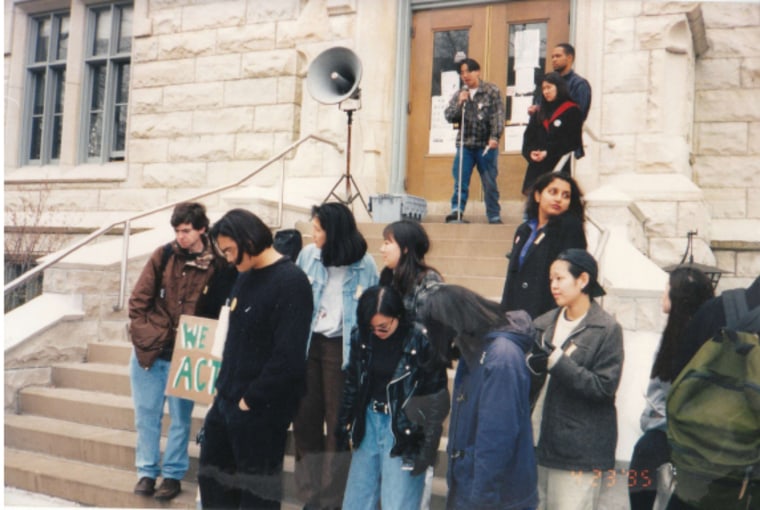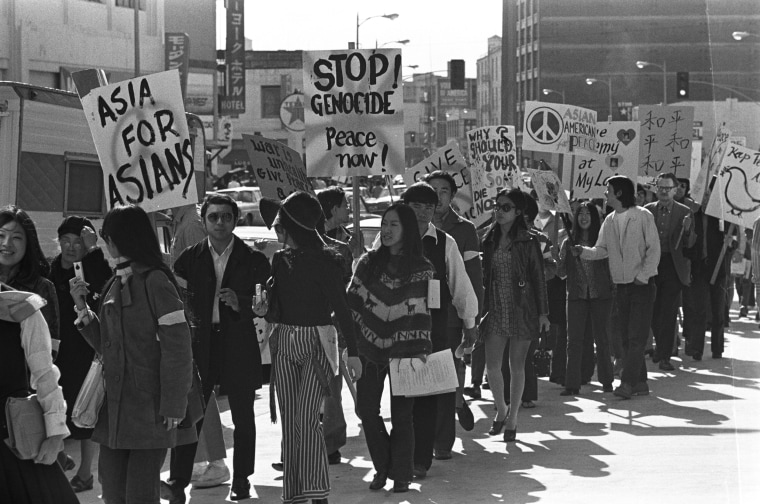Duke University had seen its Asian American student population more than double from 1990 to 2000, but some students and faculty then felt the university's course offerings didn't reflect the student body.
To address the issue, they campaigned — at first unsuccessfully — for an Asian American studies program. In 2002, students and faculty hosted a teach-in, but political will died down.
Efforts began in earnest again in 2013 following a much criticized “Asian-themed” Duke fraternity party and the more than 15-year push came to an end last year when Duke launched its Asian American Studies program. It is the only one of its kind in the American South, according to its director, Nayoung Aimee Kwon.
“For a program like this to take off, you need the students — because nothing happens without the students pushing for it — and you need faculty and the administration working together,” she said. “For all three to line up, it’s almost like a miracle for that to happen.”
Duke is one of the latest colleges to establish an Asian American studies program among a push across U.S. campuses for the field of study. According to the College Board, the not-for-profit group that administers the SAT, 25 U.S. colleges and universities offer majors in Asian American studies. The number does not include institutions like Duke that have a program but don't offer a degree.
Asian American studies dates back to the five-month strike in 1968 led by Third World Liberation Front, a coalition of student groups who demanded the creation of programs that focused on the histories of people of color. The term Asian American was created that same year, according to activists and academics.
The first Asian American studies curricula were established at the University of California, Berkeley, San Francisco State University and the University of California, Los Angeles, in 1969. But only a handful of post-secondary institutions offer degrees in the field today.
Fighting for Asian American studies
Campaigns to bring Asian American studies to the campuses can often be lengthy and dependent on students, Kwon noted.
“Since the major historical push for ethnic studies 50 years ago with the Civil Rights Movement, every program pretty much … didn’t emerge out of the university and the leaders and the faculty proposing it,” she said. “It’s usually students and activists fighting very, very hard for years and years before we can push through the inertia.”
Various groups of students at Harvard, for example, have campaigned for more than four decades for an Asian American studies program. In that time, activists have submitted a dozen proposals for the university to invest into a program.
Jeannie Park, who graduated in 1983 and is president of the Harvard Asian American Alumni Alliance, said the wait has been frustrating. The alliance earlier this year called on the university to formalize an ethnic studies program following the departure of two tenure-track faculty members who specialized in Asian American studies.
In a recent positive development, the university's faculty of arts and sciences — under which a theoretical ethnic studies department would be housed — announced it would hire three to four senior faculty specializing in ethnic studies.
“I think the approach at Harvard is they want to bring the faculty first, and then build the program around what the faculty see as the best way to do it,” Park said. “So it’s still a little slower than some of us would prefer, but it seems like there’s a new level of commitment we have not seen before.”
Harvard did not respond to a request for comment.

Students at Davidson College in North Carolina are also advocating for an Asian American studies department, starting from the bottom up.
Cathy Xu, co-founder of a group on campus called the Asian American Initiative, said the group is hoping to gain student support by hosting weekly dialogues on topics including the emasculation of Asian American men and fetishization of Asian American women.
She said that response to the dialogue series has been positive, with a high attendance of 33 students and many returning week after week.
The initiative plans to approach the administration about a program in the upcoming school year. Xu added that she doesn't expect that a department will be created by the time she graduates, but she plans to continue advocating even after graduating.
Challenges and benefits
But because students inevitably graduate, momentum advocating for the programs tend to wax and wane.
Students at Georgetown University's Asian-Pacific Islander Leadership Forum, for example, are new to pushing for a program and are aware that alumni have previously advocated for one, Jennifer Sugijanto, a member of the forum’s leadership team, said.
And when administrators are slow to act, it can result in a certain level of fatigue for students, Park, the Harvard alum, said.
Catherine Choy, chair of the department of ethnic studies at UC Berkeley, said one obstacle to convincing a university's administration to institutionalize Asian American studies is the perception that ethnic studies is useful only for a subset of students.
“That students can’t do anything with Asian American studies training, there’s so much evidence that shows that that’s just not true and that ethnic studies and Asian American studies actually contributes so much to the professional success and well-being of our students,” she said.
Graduates of Berkeley's Asian American and Asian diaspora studies program have gone on to pursue a wide range of careers, Choy said, including leading nonprofits, teaching and writing. Pulitzer Prize winner Viet Thanh Nguyen graduated from the program, she noted.
Russell Jeung, chair of the Asian American studies department at San Francisco State University, said some of the university's graduates have gone into business, public office, health care and social services. Asian American studies equips students with cross cultural competency, he added.
“We’ve created change agents,” Jeung said. “We’ve empowered students to become leaders in the community.”
For May yer Thao, executive director of the Hmong Wisconsin Chamber of Commerce, exposure to Asian American studies courses at the University of Minnesota Twin Cities was empowering and helped her understand her “responsibilities to my Asian American and Hmong communities.”
Thao advises multiple nonprofits and co-founded an informal group called ElevAsian dedicated to spotlighting the Asian American presence in Milwaukee.
“It is about giving our communities a voice, raising our visibility, fighting for resources that should also be shared with us, making room for our history and contributions to this country, and accepting us as Americans as well,” she said in an email.
The future
The program at Duke, Kwon said, is unstable despite having completed its inaugural year. It remains without its own faculty and relies on those who specialize in other fields to teach related courses. The program also currently does not offer a certificate, minor or major, a goal that appears far in the future, Kwon added.
Still, the program has advanced, hiring a program coordinator, a new full-time faculty member and bringing a postdoctoral fellow on board. Kwon said the focus this upcoming school year will be to work toward hiring more tenured and to build relationships with other programs to boost visibility and ensure the sustainability of Asian American studies.
As activists at colleges and universities continue to push for Asian American studies programs, Choy said she hopes that post-secondary institutions across the country will come to recognize why the field of study is significant.
She added that with the country's decadeslong history of Asian American studies programs, there are many examples that advocates can look to.
“It’s striking to me given the demographic significance of Asian Americans in the United States — that it is a group that has a more than a centurylong history and that continues to exponentially grow in the 21st century,” she said. “We need Asian American studies really now more than ever.”
CORRECTION (July 3, 2019, 3:27 p.m. ET): A previous version of this article misspelled the last name of the director of Duke's Asian American Studies program. She is Nayoung Aimee Kwon, not Nayoung Aimee Kwan.
Follow NBC Asian America on Facebook, Twitter, Instagram and Tumblr.




